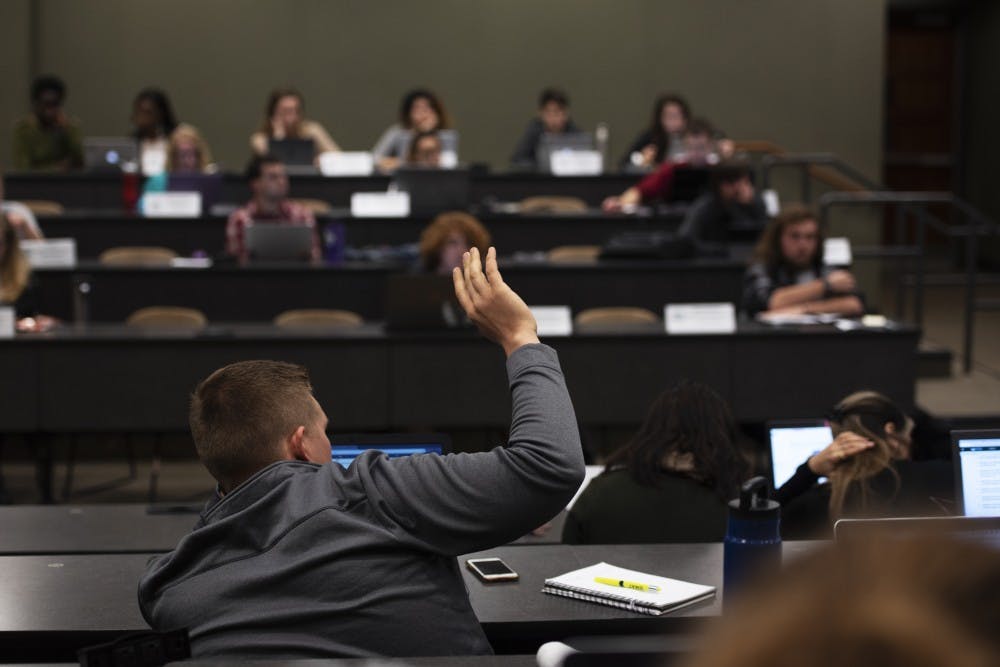Student Senate proposed a resolution that would eliminate graduate students from Student Senate’s constitution at last Wednesday’s meeting. It was heavily denied with only two opposing votes.
“This has been a conversation for several years now between Graduate Student Senate and Student Senate,” Student Senate President Madison Sloat said.
The Student Senate resolution would change the Constitution of Student Senate to say undergraduate students instead of all students.
Graduate Student Senate received information about the resolutions prior to Student Senate’s meeting. GSS members voted on the resolution at the GSS meeting on March 19 to show full support of the resolution to Student Senate.
In order to express GSS’s thoughts on the resolution, Sen. Emeritus Daniel Williams attended Student Senate’s meeting last Wednesday.
The exclusion of graduate students from the Student Senate Constitution struck an argument between the two bodies. The argument is focused on both the constituents of the bodies as well as the independence of GSS.
“We felt it needed to be democratically discussed by our body,” Student Senate Vice President Hannah Burke said. “It was really important for us to bring that forward and have a rigorous debate about this.”
GSS President Maria Modayil said the resolution would have given GSS independence from Student Senate. Sloat and Burke both said this is inaccurate.
“They are already independent,” Burke said. “We can’t say Maria (Modayil) can and can’t do something.”
Sloat said GSS and Student Senate are completely separate bodies that were created for entirely separate reasons.
The resolution was important for both sides. For GSS, its ability to become an independent representative body was most important.
Modayil said there are diverse needs of graduate and professional students across numerous programs and departments at all campuses of Ohio University.
Student Senate expressed the importance to keep the two bodies on good terms. One concern of Student Senate members was, by passing the resolution, the collaboration between GSS and Student Senate would dwindle.
“There are several concerns about stagnate collaboration between the two bodies,” Student Senate representatives said in a tweet.
Along with the resolution came several concerns from both sides. Modayil said there was an overlap in representation of graduate students by the two bodies, leaving graduate students confused on who represents them.
Modayil also said the oversight Student Senate has on GSS is troublesome. However, Burke said there is no oversight, and any student can bring a resolution or bill to the Student Senate body to be voted on.
Student Senate also expressed unease regarding the lack of representation in GSS minority affairs, specifically students with disabilities. Modayil said GSS will advocate for students and any issues they may face. GSS members have the ability to bring forward a resolution to the body.
“We shouldn’t restrict ourselves because we don’t have that specific commissioner,” Modayil said.
Modayil also said one driving force between the debate was lack of representation for GSS and graduate students in the Student Senate body. There is a senator for the Graduate College, but the position is not filled.
As of now, there is only one graduate student representative on Student Senate. However, Burke said Student Senate would always advocate for GSS to have “a seat at the table.”
Modayil said one representative in Student Senate cannot represent over 6,000 graduate students. However, the number of graduate students in the Student Senate body can vary each year.
“Any positions, including executives, can be filled by graduate students,” Sloat said.
One last reason for Student Senate’s disapproval of the resolution involved the funding of the Senate Appropriation Commission (SAC). Student Senate worried about a division between SAC funding.
“SAC doesn’t distinguish based on graduate and undergraduate students,” Sloat said. “We fund graduate student organizations all the time.”
If GSS became a separate body, it would be unknown if the body would be able to receive funding from SAC. Modayil said GSS already struggles with funding and wants to worry about the constitutional and representative issues prior to money.
Because the resolution did not pass and no constitutional amendments were made regarding GSS, Student Senate passed a bill of affirmation.
The bill stated Student Senate will continue to advocate for representatives of Graduate Student Senate on all conversations, including conversations regarding students as a whole.
“The bill reinforces what we are doing now,” Sloat said. “It was also about addressing concerns Maria (Modayil) had.”
Modayil said the affirmation bill “does not change anything.” She also said GSS does not plan to stop pushing for its independence.
“Given years of vagueness in graduate student representation, such an action as independence would be monumental,” Modayil said.
Sloat disagrees with the continuation of the debate over Student Senate and GSS.
“I really think we are shooting ourselves in the foot by continuing to focus on this conversation and failing to talk about all the ways we could be collaborating,” Sloat said.
GSS will host a press conference on Tuesday at 5:30 p.m. in Baker 237 to discuss matters and address misinformation about its independence, according to a GSS press release.






